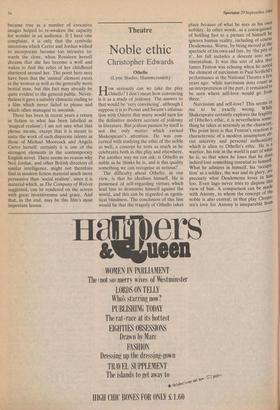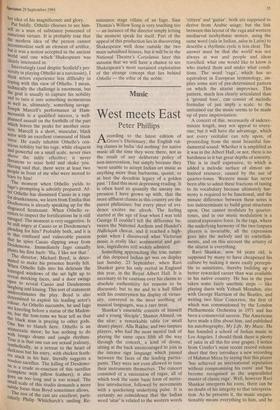Theatre
Noble ethic
Christopher Edwards
Othello (Lyric Studio, Hammersmith)
How seriously can we take the play Othello? I don't mean how convincing is it as a study of jealousy. The answer to that would be 'very convincing', although I suppose it is to Proust and Swami's infatua- tion with Odette that many would turn for the definitive modern account of jealousy in literature. But jealous passion by itself is not the only matter which earned Shakespeare's attention. He was con- cerned with studying the ethic of the noble as well, a concept he tests as much as he celebrates both in this play and elsewhere. Put another way we can ask: is Othello as noble as he thinks he is, and is this quality something we can recognise as serious?
The difficulty about Othello, in one view, is that he idealises himself. He is possessed of self-regarding virtues which lead him to dramatise himself against the world, and this can be regarded as egotis- tical blindness. The conclusion of this line would be that the tragedy of Othello takes
place because of what he sees as his own nobility. In other words, as a consequence of holding fast to a picture of himself he ignores human reality, including of course Desdemona. Worse, by being moved at the spectacle of his own sad fate, by 'the pity of it', his fall includes a descent into sen- timentalism. It was this sort of idea that James Fenton was echoing when he noted the element of narcissism in Paul Scofield 's performance at the National Theatre a few years ago: 'while narcissism does count as an interpretation of the part, it remained to be seen where self-love would go from there.' Narcissism and self-love? This seems to , me to be exactly wrong. While Shakespeare certainly explores the fragilitY of Othello's ethic, it is nevertheless some- thing he takes as seriously as the character: The point here is that Fenton's reaction is characteristic of a modern assumption ab- out sincerity and personal authenticity which is alien to Othello's ethic. He is a warrior, his role in the world is part of what he is, so that when he loses that he does indeed lose something essential to himself. What he admires in himself, his 'occupa- tion' as a soldier, the war and its glory, are precisely what Desdemona loves in MM. too. Even lago never tries to dispute this view of him. A comparison can be made with Antony, to whom the concept of the noble is also central; in that play Cleopa- tra's love for Antony is inseparable from
her idea of his magnificence and glory.
Put baldly, Othello chooses to see him- self as a man of substance possessed of conscious virtues. It is probably true that the modern idea of the person cannot accommodate such an element of artifice, but it was a notion accepted in the ancient world and one which Shakespeare was clearly interested in. Interestingly (and despite Scofield's per- versity in playing Othello as a narcisssist), I think actors experience less difficulty in coping with this view of Othello. I mean, technically the challenge is enormous, but the goal is usually to capture his nobility and to turn it into something momentous as well as, ultimately, something savage. Joseph Marcell's performance at Ham- mersmith is a qualified success, a well- planned assault on the foothills of the part Which leaves the peaks for another occa- sion. Marcell is a short, muscular, black actor with an excellent command of blank verse. He easily inhabits Othello's con- scious nobility but his rage, while eloquent and powerful on a small scale, never rises above the tidily effective; it never threatens to seize hold and shake you. Having said that, there were at least two People in front of me who were moved to tears by him! The moment when Othello yields to lago's prompting is adroitly prepared. Af- ter Othello has dismissed Cassio in a rage for drunkenness, we learn from Emilia that Desdemona is already speaking up for the disgraced lieutenant. When Othello re- enters to inspect the fortifications he is still enraged. The moment is very suggestive. Is he still angry at Cassio or at Desdemona's pleading for him? Probably both, and it is in this confused and vulnerable passion ...,that he spies Cassio slipping away from Desdemona. Immediately Iago casually Plants his first barb: 'Ha, I like not that.' The director, Michael Boyd, is deter- mined to make his presence heavily felt. When Othello falls into his delirium the lozenged windows of the set light up to reveal mocking faces, and a door swings ?Pen to reveal Cassio and Desdemona laughing and kissing. This sort of statement underestimates the play. Boyd is also determined to exploit his leading actor's colour. As Othello succumbs, he and Iago are kneeling before a statue of the Madon- na, but the tom-toms we hear tell us that the black man is praying to other gods. One has to blanch here. Othello is an aristocratic moor; he has nothing to do _with bongo drums and jungle rhythms. True it is that one can see sexual jealousy, sYmbolically, as a retreat to the heart of darkness but his entry, with chicken feath- ers stuck in his hair, literally suggests a voodoo sacrifice. The killing of Desdemo- na s a crude re-enaction of this sacrifice (complete with pillow feathers); it also goes on too long and is too sexual. The small scale of this studio demands a more subtle focus than Boyd sometimes allows. The rest of the cast are excellent, parti- cularly Philip Whitchurch's smiling Re- naissance stage villain of an Iago. Sian Thomas's Willow Song is very touching too — an instance of the director simply letting the moment speak for itself. Part of the appeal of this production lies in discovering Shakespeare well done outside the two main subsidised houses, but it will be in the National Theatre's Coriolanus later this autumn that we will have a chance to see Shakespeare's most sustained exploration of the strange concept that lies behind Othello — the ethic of the noble.















































 Previous page
Previous page